
In Japan, music includes a wide array of distinct genres, both traditional and modern. The word for "music" in Japanese is 音楽 (ongaku), combining the kanji 音 on (sound) with the kanji 楽 gaku. Japan is the world's largest market for music on physical media and the second-largest overall music market, with a retail value of US$2.7 billion in 2017.
Shoukichi Kina, is a Japanese rock musician and politician. He, along with his band Champloose, played a large role in the Okinawan home-grown "folk rock" scene in the 1970s and 1980s. His first big hit was "Haisai Ojisan" in 1972, which he wrote when he was in high school. A Song from the 1980 album Blood Lines, "Hana" also named "Subete no Hito no Kokoro ni Hana o", is frequently heard in international markets.
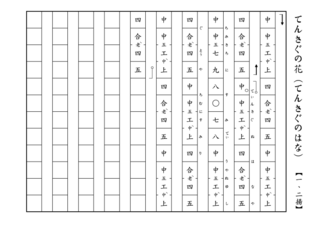
Tinsagu nu Hana (てぃんさぐぬ花), also erroneously called Chinsagu nu Hana, is an Okinawan song about traditional Ryukyuan values such as filial piety and other Confucian teachings in the Okinawan language.
Okinawan music is the music associated with the Okinawa Islands of southwestern Japan. In modern Japan, it may also refer to the musical traditions of Okinawa Prefecture, which covers the Miyako and Yaeyama Islands in addition to the Okinawa Islands. It has its roots in the larger musical traditions of the Southern Islands.
The sanshin is an Okinawan and Amami Islands musical instrument and precursor of the mainland Japanese shamisen. Often likened to a banjo, it consists of a snakeskin-covered body, neck and three strings.
Begin is a Japanese pop rock group from Ishigaki Island in the Yaeyama Islands of Okinawa Prefecture, Japan. Their sound contains many elements of traditional Okinawan music, and prominently features the sanshin.
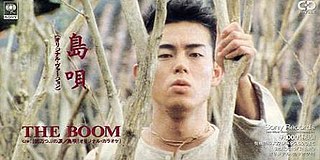
"Shima Uta" is a 1992 song by the Japanese band The Boom. It was written by the lead singer, Kazufumi Miyazawa, based on his impressions from visiting Okinawa for a photo shoot. It is the band's best selling song, well known throughout Japan and Argentina, and one of the most widely known songs associated with Okinawa although the band members are all from Yamanashi Prefecture. The song uses a mix of modern pop and rock styles as well as min'yō. Okinawan musical instruments and Okinawan vocabulary have been incorporated into the song.
Yoko Utsumi is a Japanese musical artist. Her solo music is a blend of punk, rock and ska influences, with some blues and jazz thrown in. During her long career, she has also played Japanese traditional music.

"Never End" is the 17th single by Japanese recording artist Namie Amuro. It was released on July 12, 2000, as the lead single from her fifth studio album Break the Rules (2000). The track was made specifically for the 26th G8 summit that took place in Amuro's home prefecture Okinawa during July of that year. "Never End" was written, composed and arranged solely by her long-time producer Tetsuya Komuro. Musically, it is a pop ballad that takes influences from Okinawan music. Lyrically, the song describes distant memories, distant places, and distant emotions, indicating a longing for connection and understanding.
Kakegoe (掛け声) usually refers to shouts and calls used in performances of traditional Japanese music, Kabuki theatre, and in martial arts such as kendo.
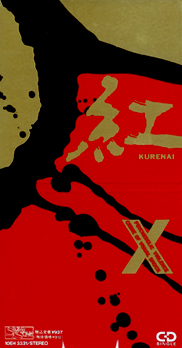
"Kurenai" is a song by Japanese heavy metal band X Japan, written by Yoshiki. One of the band's oldest songs, they have been performing "Kurenai" since 1985, and several versions have been released, most significantly as their major-label debut single on September 1, 1989.
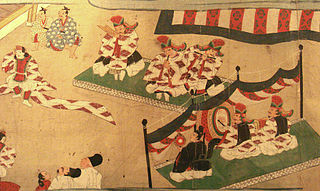
Traditional Japanese music is the folk or traditional music of Japan. Japan's Ministry of Education classifies hōgaku as a category separate from other traditional forms of music, such as gagaku or shōmyō, but most ethnomusicologists view hōgaku, in a broad sense, as the form from which the others were derived. Outside of ethnomusicology, however, hōgaku usually refers to Japanese music from around the 17th to the mid-19th century. Within this framework, there are three types of traditional music in Japan: theatrical, court music, and instrumental.
Nēnēs (ネーネーズ) is an Okinawan folk music group formed in 1990 by China Sadao (知名定男). The group name means "sisters" in Okinawan. Nēnēs is composed of four female singers who perform traditional Okinawan folk songs in traditional costume with sanshin accompaniment; they have also performed with a backing band, Sadao China Gakudan. They toured Europe and played New York City in 1994. An independent release, IKAWŪ, landed them a recording contract with Sony Records and a collaboration with Ryuichi Sakamoto. They hold a resident gig at the Live House Shima-Uta club in Naha, Okinawa.
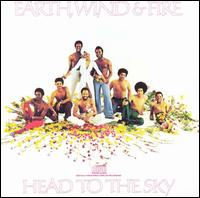
Head to the Sky is the fourth studio album by American band Earth, Wind & Fire, released in May 1973 on Columbia Records. The album rose to No. 2 on the Billboard Top Soul Albums chart and No. 27 on the Billboard 200 chart. Head to the Sky has also been certified Platinum in the US by the RIAA.
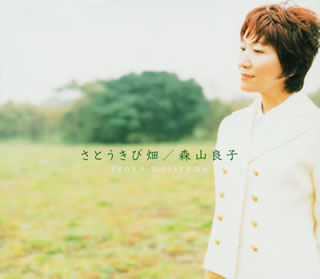
"Nada Sōsō" is a song written by Japanese band Begin and singer Ryoko Moriyama. It was first released by Moriyama in 1998, but achieved popularity through the cover version by Rimi Natsukawa in 2001.

Paraiso is Haruomi Hosono's fourth solo album and Yellow Magic Band's first album. This album continues the tropical style of Hosono House, Tropical Dandy and Bon Voyage co., while being influenced by the music of Hawaii and Okinawa, incorporating electronic sounds that would be later developed on Hosono's and YMO's careers. YMO, The Yellow Magic Band at this point in time, was composed of Tin Pan Alley members and studio musicians, such as Hosono's former Happy End bandmate Shigeru Suzuki and future YMO members Ryuichi Sakamoto and Yukihiro Takahashi, as well as guitarist Hirofumi Tokutake.

Live from the Powerhouse is an album rehearsed in six days, starting on 1 March 2002 in the seaside town of Rye, Victoria in Australia, by multicultural group Mozaik featuring Andy Irvine, Dónal Lunny, Bruce Molsky, Nikola Parov and Rens van der Zalm.

Live in Dublin is the second live album by Irish folk rock band Moving Hearts, recorded in 2007 at the Vicar Street venue in Dublin by Tim Martin. Noel Eccles and Keith Donald were executive producers, and the album was mixed by Andrew Boland and mastered by Martin Giles at Alchemy, in London.
Ryukyuan culture are the cultural elements of the indigenous Ryukyuan people, an ethnic group native to Okinawa Prefecture and parts of Kagoshima Prefecture in southwestern Japan.
China Sadao is a Japanese musician active in the Okinawan music and shima-uta scene, as a performer on the sanshin, min'yō folk singer, song-writer, and producer, having been responsible in 1990 for the formation of the Nēnēs.










